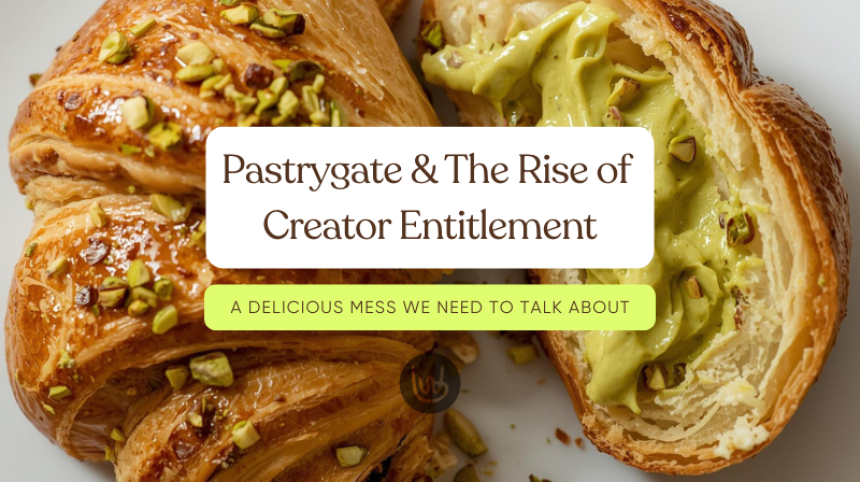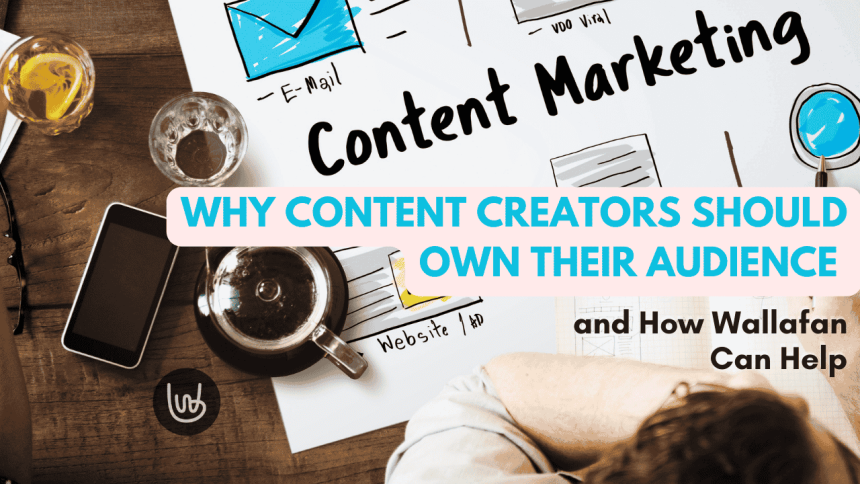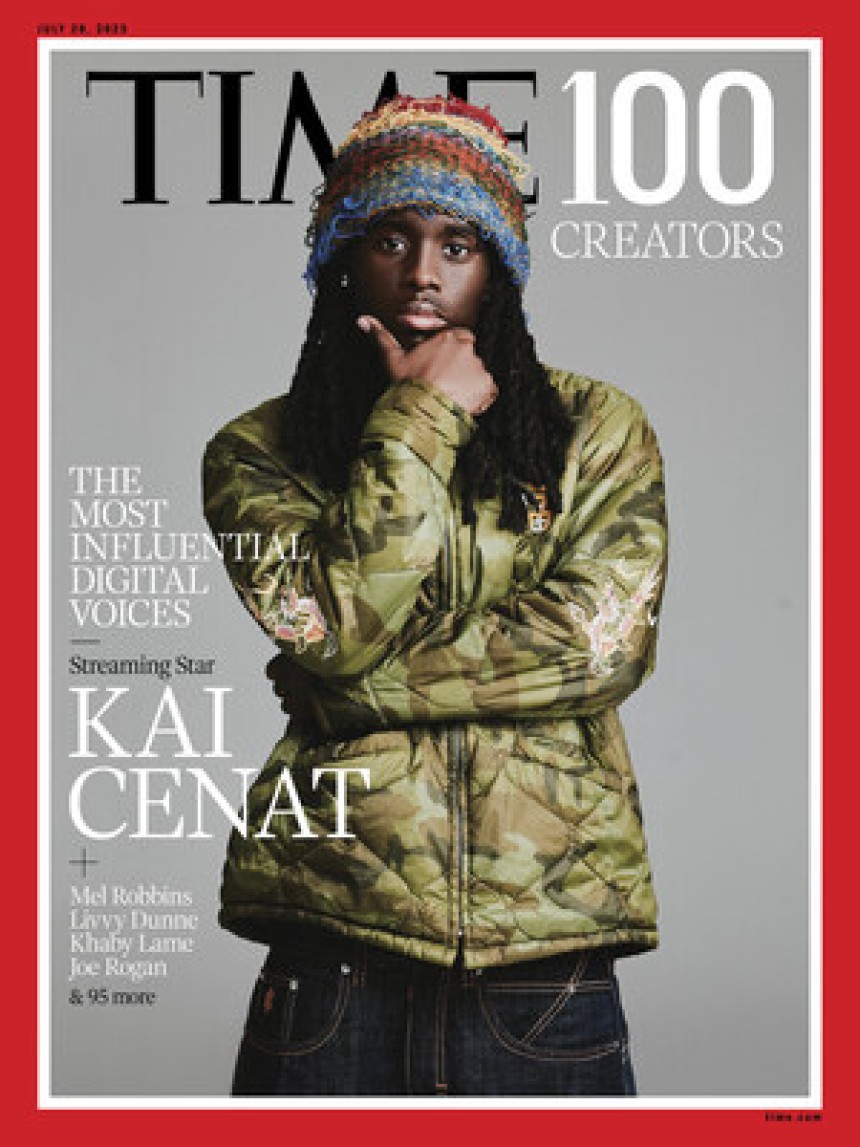
Pastrygate & The Rise of Creator Entitlement
A cautionary tale of clout-chasing, croissants, and consequences.
Welcome to today’s episode of “Influencers Behaving Badly.”
Grab a croissant. Actually—grab two, because apparently talking about pastries on the internet now requires emotional support carbs.
Let’s talk about creator entitlement: that magical moment where someone with a ring light and a following starts acting like the world is a VIP lounge and they’re the only name on the list.
Now—before we dive into the mess—let’s get one thing straight.
Not all creators are out here demanding freebies and roasting small businesses for clout. In fact, most food reviewers, creators, and critics take their craft seriously. They pay their way, they do their research, and they actually respect the people behind the counter.
So, when someone waltzes in and behaves like the main character at a pastry shop, it’s not just cringe — it’s an insult to every creator who’s put in the work, built trust with their audience, and earned their seat at the table.
And trust me: the creators who read this and think,
“Oh yeah, I know exactly the type you’re talking about — could never be me,”
are the ones doing it right.
Unfortunately, today’s story is not about those creators.
It’s about the other kind.
And no recent story sums this up better than the now-infamous showdown between TikTok creator Glamorama and Phoenix’s beloved bakery JL Patisserie.
Spoiler:
Only one side came out of this looking buttery and golden.
The other… slightly burnt.
So What Even Happened? The Pastrygate Recap
JL Patisserie is one of those bakeries where everything is made by hand, ingredients are imported from Europe, and the vibes are “chef’s kiss.”
Enter Glamorama, a TikToker who reviews restaurants with the confidence of Gordon Ramsay and the subtlety of a bull dressed in glitter.
According to the bakery, Glamorama first reached out asking for a collaboration—a.k.a., “Can I get free food in exchange for a glowing review?” JL Patisserie politely declined.
And then…the plot thickened.
Like overworked pastry dough.
Glamorama showed up anyway, paid for her order, and then posted a scathing review: the quiche crust was “paper-thin,” the coffee was “super sour,” and the pistachio filling? She called it “fake-ass” because it was bright green — which, by the way, is precisely what happens when you use real Italian pistachio paste and not the sad grocery-store stuff.
JL Patisserie clapped back hard — but in that classy French-pastry-chef way. The owner made a video holding up the literal tub of authentic pistachio paste, as if it were Exhibit A in the trial of The People vs. Misinformation.
The internet took sides.
Let’s just say Glamorama was not the people’s princess that day.
What NOT to Do as a Creator (Please. We’re Begging.)
🚫 1. Don’t act like you’re owed freebies.
A collab request is fine.
But assuming a business must pay you in croissants for exposure?
No, bestie. That’s not it.
🚫 2. Don’t make bold claims you haven’t fact-checked.
Calling something “fake” when it’s literally imported from Italy is… quite a choice.
🚫 3. Don’t weaponize your following.
Small businesses are not NPCs in the video game of your content calendar.
🚫 4. Don’t confuse “honesty” with “dragging someone for views.”
You can critique. You can be real.
But if your tone screams “I want this to go viral,” you’re no longer reviewing — you’re performing.
🚫 5. Don’t get defensive when the business responds.
If you’re bold enough to post a negative review, be mature enough to handle a rebuttal.
What TO Do Instead (AKA: How Not To Get Roasted by the Entire Internet)
✔️ 1. Lead with transparency.
If you want to collab, clarify:
“Do you want honest coverage, or promo coverage?”
They’re not the same.
✔️ 2. When in doubt, pay.
It instantly removes pressure and looks way better.
✔️ 3. Research before you review.
Learn why the pastry is green before accusing it of being radioactive.
✔️ 4. Balance your take.
If the quiche crust was a crime against humanity, but the latte was delicious, say both.
✔️ 5. Think about impact.
A harsh review can change a small business’s entire week.
Or month.
Or payroll.
✔️ 6. If you get called out, consider listening instead of doubling down.
We know—wild concept.
Keith Lee, Patron Saint of Ethical Reviewing
And just when the internet thought the pastry discourse had peaked, in walks Keith Lee — a man who reviews restaurants the way your favorite cousin gives advice: honest, fair, and never out to embarrass anyone’s mama.
Keith heard the drama, packed up his trademark humility, and went to JL Patisserie quietly.
No “Do you know who I am?”
No “Give me free stuff for a shoutout.”
No “Let me stir the pot for views.”
He paid for his order.
He reviewed it respectfully.
He gave balanced feedback that didn’t punch down on a small business.
And miraculously?
He managed to review pastries without accusing them of crimes against pistachio humanity.
Keith didn’t make the story about himself.
He didn’t attack the creator involved.
He didn’t farm drama.
He modeled exactly what responsible influence looks like:
✔️ Pay your way
✔️Tell the truth
✔️ Lead with compassion
✔️ Use your platform to uplift, not annihilate
Creators: take notes.
This is how you build trust and longevity in the creator economy.
Why This Matters for Creators (Yes, Even You With 500 Followers)
Influencing isn’t just aesthetics and affiliate links anymore. It’s an actual ecosystem — and it depends on trust.
When creators start expecting handouts or post-dramatic reviews for clout, audiences get skeptical. Businesses get defensive. And suddenly we’re all fighting in a comments section over a pastry that literally did nothing wrong.
This moment is bigger than one bad review.
It’s about ethics.
Professionalism.
And whether creators want long-term credibility or short-term virality.
Don’t be the next Pastrygate.
Wallafan helps creators show their value without begging for freebies or burning bridges.
Create your portfolio, prove your professionalism, and get discovered the ethical way.
Be the type of creator people root for — not the one who becomes a meme before breakfast.
Author Bio
Ashley is a busy wife and mother who can often be found listening to an audiobook while driving the mom taxi in a desperate attempt to cling to her sanity through the joy of escapism. Her love of reading inspired her to return to school, and she is currently finishing her bachelor’s degree in creative writing at Southern New Hampshire University. Being a mother does not mean you have to give up your dreams; her story is still being written.





